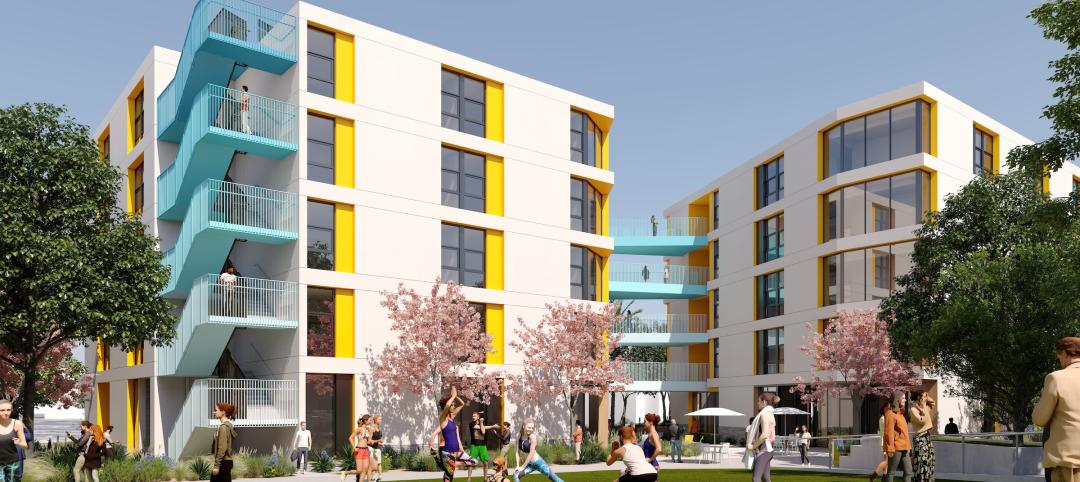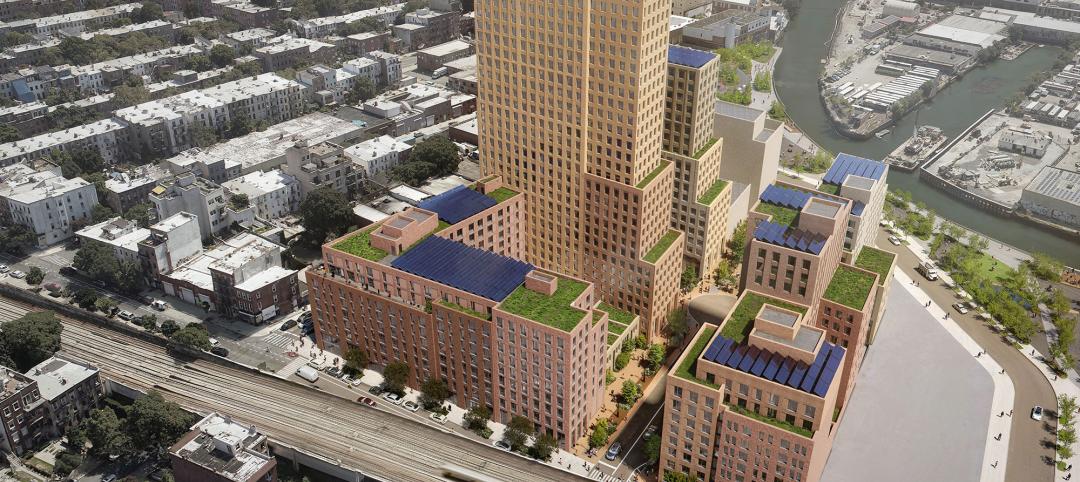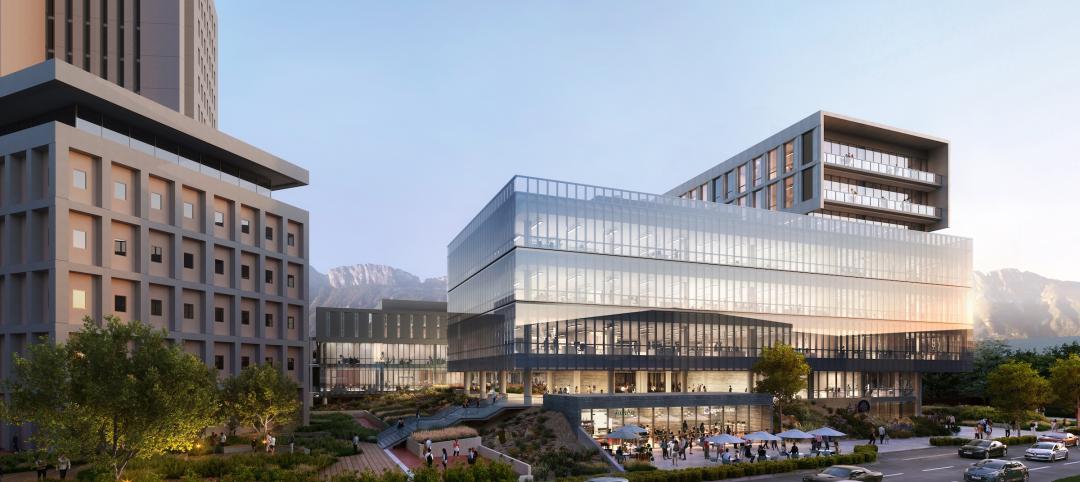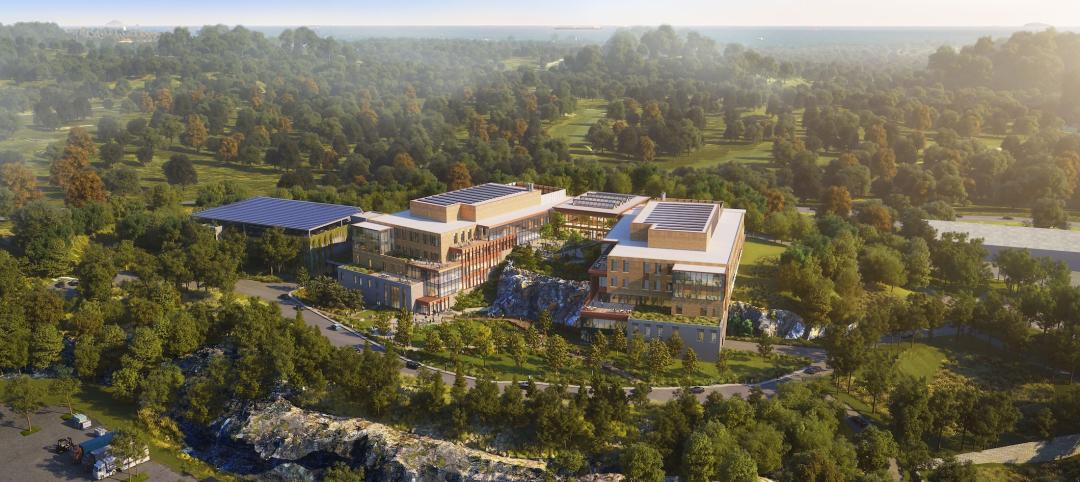Since 1950, the College World Series has been played in Omaha, Neb., the only NCAA event that has stayed in one location for over 60 years. Over the course of six decades, the community of Omaha has developed strong emotional ties to the College World Series as well as to its home field, Rosenblatt Stadium.
Originally built for minor league play in the 1940s, in recent years Rosenblatt Stadium had begun to shows its age, and patchwork renovations could not improve it enough to satisfy the demands of fans, the NCAA, and CWS broadcast partner ESPN.
As the contract for the College World Series came up for renewal, the city formed a committee to evaluate whether to try to reconstruct Rosenblatt Stadium or build new on one of eight potential new sites. Once it was determined to build new and a site was selected, the Building Team, led by local A/E firm HDR Architecture Inc., in collaboration with Populous, Kansas City, Mo., worked with the owner, the Metropolitan Entertainment and Convention Authority (MECA), to refine the ballpark’s final programming and design.
SPEEDING DOWN THE BASEPATHS
The new stadium had to be ready by April 2011 for the first pitch of the 2011 College World Series, which put the project on a 28-month construction schedule. To keep up the pace, members of the local GC/CM firm Kiewit Building Group moved into the HDR Omaha office. HDR and Populous collaborated on the design process, which involved meeting the needs of ESPN, the city of Omaha, MECA, and the College World Series of Omaha.
Project summary
SILVER AWARD
TD Ameritrade Park, Omaha, Neb.Building Team
Submitting firm: HDR Architecture Inc. (AOR, structural/ME engineer)
Owner/developer: Metropolitan Entertainment & Convention Authority
Architect of MEP coordination: DLR Group
Sports architect: Populous
Consulting structural engineer: Thornton Tomasetti
ME consulting engineer, plumbing engineer: M-E Engineers Inc.
GC/CM: Kiewit Building GroupGeneral Information
Size: 253,638 sf enclosed, 597,458 sf including concourse
Construction cost: $91 million
Construction period: January 2009 to April 2011
Delivery method: CM at risk
The structural program called for the stadium to be separated into two parts, the grandstand and the lower seating bowl/outfield area. This division allowed two teams to work on the structure simultaneously during the design development phase, which saved considerable time.
The Building Team incorporated a mechanically stabilized earth wall system to retain the lower seating bowl earth fill, in lieu of a system of structural concrete retaining walls and footing. This option alone saved the project over $500,000.
“The construction of this stadium was a feat to pull off so quickly and the coordination between infield and outfield was challenging,” said Building Team Award Judge Timothy Brown, AIA, studio associate professor and director of international affairs, Illinois Institute of Technology.
MEETING THE NEEDS OF NUMEROUS PLAYERS
Unique in capacity and character, TD Ameritrade Park was built as a hybrid to accommodate not only NCAA Division I requirements for baseball but also music festivals, football, and even ice hockey.
“The Trade,” as it has come to be known, opened to a sellout crowd on April 19, 2011 (Nebraska 2, Creighton 1). The 24,000-seat stadium has the cozy feel of a minor league park but is loaded with the amenities of a Major League Baseball stadium: 26 suites, four team clubhouses, administrative offices, 5,000 sf of retail space, and a continuous 360-degree concourse. Total building area is 597,458 sf, 253,638 sf of which is enclosed.
The Building Team for TD Ameritrade Park competed against a short schedule, on a difficult site, and under public pressure to ensure the College World Series would stay in Omaha. Perhaps the highest compliment of the new park came from two long-time College World Series ticketholders who told NCAA Vice President for Baseball and Football Dennis Poppe, “Mr. Poppe, we came up here just wanting to hate this park, but it’s pretty nice.” BD+C
--
Click here to view exclusive video interviews of the 2012 Building Team Awards judges explaining their selections.
Related Stories
Student Housing | Apr 19, 2024
$115 million Cal State Long Beach student housing project will add 424 beds
A new $115 million project recently broke ground at California State University, Long Beach (CSULB) that will add housing for 424 students at below-market rates. The 108,000 sf La Playa Residence Hall, funded by the State of California’s Higher Education Student Housing Grant Program, will consist of three five-story structures connected by bridges.
Construction Costs | Apr 18, 2024
New download: BD+C's April 2024 Market Intelligence Report
Building Design+Construction's monthly Market Intelligence Report offers a snapshot of the health of the U.S. building construction industry, including the commercial, multifamily, institutional, and industrial building sectors. This report tracks the latest metrics related to construction spending, demand for design services, contractor backlogs, and material price trends.
MFPRO+ New Projects | Apr 16, 2024
Marvel-designed Gowanus Green will offer 955 affordable rental units in Brooklyn
The community consists of approximately 955 units of 100% affordable housing, 28,000 sf of neighborhood service retail and community space, a site for a new public school, and a new 1.5-acre public park.
Construction Costs | Apr 16, 2024
How the new prevailing wage calculation will impact construction labor costs
Looking ahead to 2024 and beyond, two pivotal changes in federal construction labor dynamics are likely to exacerbate increasing construction labor costs, according to Gordian's Samuel Giffin.
Healthcare Facilities | Apr 16, 2024
Mexico’s ‘premier private academic health center’ under design
The design and construction contract for what is envisioned to be “the premier private academic health center in Mexico and Latin America” was recently awarded to The Beck Group. The TecSalud Health Sciences Campus will be located at Tec De Monterrey’s flagship healthcare facility, Zambrano Hellion Hospital, in Monterrey, Mexico.
Market Data | Apr 16, 2024
The average U.S. contractor has 8.2 months worth of construction work in the pipeline, as of March 2024
Associated Builders and Contractors reported today that its Construction Backlog Indicator increased to 8.2 months in March from 8.1 months in February, according to an ABC member survey conducted March 20 to April 3. The reading is down 0.5 months from March 2023.
Laboratories | Apr 15, 2024
HGA unveils plans to transform an abandoned rock quarry into a new research and innovation campus
In the coastal town of Manchester-by-the-Sea, Mass., an abandoned rock quarry will be transformed into a new research and innovation campus designed by HGA. The campus will reuse and upcycle the granite left onsite. The project for Cell Signaling Technology (CST), a life sciences technology company, will turn an environmentally depleted site into a net-zero laboratory campus, with building electrification and onsite renewables.
Codes and Standards | Apr 12, 2024
ICC eliminates building electrification provisions from 2024 update
The International Code Council stripped out provisions from the 2024 update to the International Energy Conservation Code (IECC) that would have included beefed up circuitry for hooking up electric appliances and car chargers.
Urban Planning | Apr 12, 2024
Popular Denver e-bike voucher program aids carbon reduction goals
Denver’s e-bike voucher program that helps citizens pay for e-bikes, a component of the city’s carbon reduction plan, has proven extremely popular with residents. Earlier this year, Denver’s effort to get residents to swap some motor vehicle trips for bike trips ran out of vouchers in less than 10 minutes after the program opened to online applications.
Laboratories | Apr 12, 2024
Life science construction completions will peak this year, then drop off substantially
There will be a record amount of construction completions in the U.S. life science market in 2024, followed by a dramatic drop in 2025, according to CBRE. In 2024, 21.3 million sf of life science space will be completed in the 13 largest U.S. markets. That’s up from 13.9 million sf last year and 5.6 million sf in 2022.

















